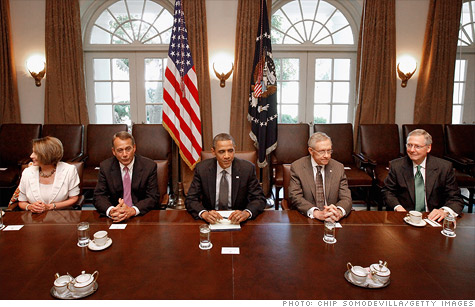
A protracted battle over increasing the debt limit last summer increased the country's borrowing costs for months before a deal was struck, a new government report estimates.
NEW YORK (CNNMoney) -- Turns out there's a price to pay for incessant fighting in Congress and political grandstanding.
The federal government spent an extra $1.3 billion to borrow last year because of the showdown over the debt ceiling, the Government Accountability Office reported Monday.
Republicans in Congress and the Obama administration were locked in battle for months over how to raise the country's legal borrowing limit.
"Delays in raising the debt limit can create uncertainty in the Treasury market and lead to higher Treasury borrowing costs," the GAO said.
Indeed, even though bond rates were low last year, the GAO found that the Treasury Department paid a premium on many government securities in the eight months leading up to the eventual deal in August.
The premium reflected the relative risk of government securities to private-sector debt.
Rates on private-sector debt are typically higher than those on government bonds. But the difference between the two narrowed in 2011.
In other words, investors demanded the government pay higher rates than it would have on federal debt with due dates of two years or more.
The GAO, the country's official auditor, also noted that the longer term costs of the 2011 debt limit fight will be higher, since the interest costs that Treasury locked in during the first eight months of the year will be paid out over time.
There were intangible costs as well amidst the months of uncertainty that preceded lawmakers' deal to raise the debt ceiling and the subsequent downgrade of the country's credit rating by Standard & Poor's.
"[M]anaging federal debt ... was complex, time-consuming, and technically challenging," the GAO said.
Congress, of course, will eventually have to raise the debt ceiling again. Exactly when is unclear.
The legal borrowing limit is currently $16.394 trillion.
As of last Thursday, the country's accrued debt stood $559 billion below that limit. If the government continues to run monthly deficits between $100 billion and $125 billion, the debt load may approach the ceiling as early as mid-November.
But Treasury can buy some time with so-called extraordinary measures such as suspending contributions to federal pension plans.
Has Congress learned its lesson about the risks of political brinksmanship? Apparently not.
For starters,House Speaker John Boehner in May issued the same ultimatum on the debt ceiling that he issued in 2011. He said any debt ceiling increase must be accompanied by an even larger amount of spending cuts.
Since then, both parties have engaged in a battle over the so-called fiscal cliff -- a series of large, overnight tax increases and spending cuts. Combined they would hurt the economy in the short-run if Congress does nothing to replace them with more gradual deficit-reduction strategies.
Just what lawmakers will do about the cliff -- and when -- is unclear. And that uncertainty is already thought to be hurting the economy through a slowdown in hiring and a reluctance among businesses to invest. ![]()
| Overnight Avg Rate | Latest | Change | Last Week |
|---|---|---|---|
| 30 yr fixed | 3.80% | 3.88% | |
| 15 yr fixed | 3.20% | 3.23% | |
| 5/1 ARM | 3.84% | 3.88% | |
| 30 yr refi | 3.82% | 3.93% | |
| 15 yr refi | 3.20% | 3.23% |
Today's featured rates:
| Latest Report | Next Update |
|---|---|
| Home prices | Aug 28 |
| Consumer confidence | Aug 28 |
| GDP | Aug 29 |
| Manufacturing (ISM) | Sept 4 |
| Jobs | Sept 7 |
| Inflation (CPI) | Sept 14 |
| Retail sales | Sept 14 |